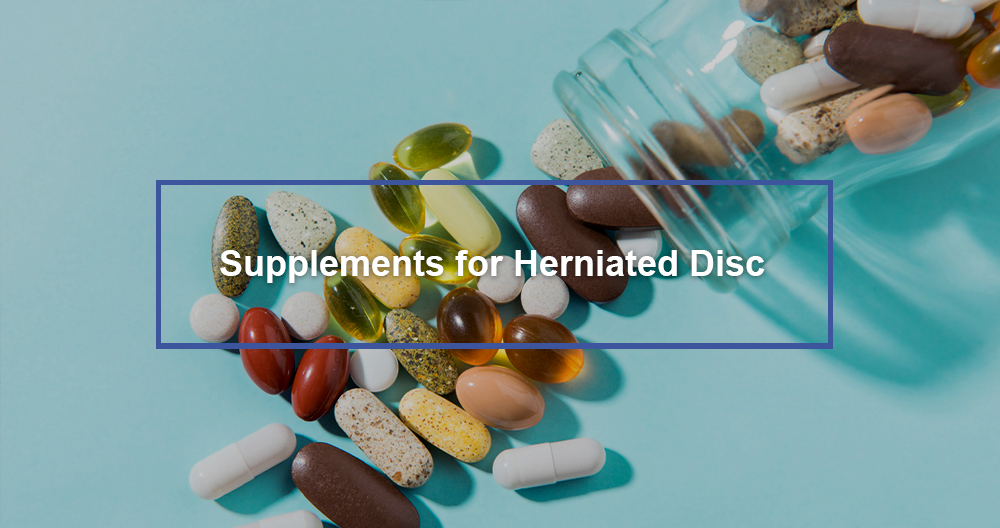
Herniated spinal discs happen when the discs in the spine are damaged. It affects the ability of a person to move painlessly and can lead to a recurrence. There are some pain relief options that can be used to relieve herniated disc symptoms.
Herniated Discs
Before seeking out remedies, it is important that you understand what herniated discs are. Multiple terms can be used for disc problems like bulging disc or collapsed disc, pinched nerve, or slip disc. All these terms share one thing: the disc has been damaged in some way.
The shock absorbers that connect each vertebra to the spine are called spinal discs. They protect the spine from damage and its surrounding nerves. But, when one disc becomes damaged, it can cause impairment in its function. The injured disc can then place pressure on the surrounding nerves, creating pain. This may sometimes radiate to the limbs.
Discs are made up of a soft inner and hard outer layers. If there is ever a disc tear, the soft inner core of the disc may leak out and cause disc deflation. While herniated discs can happen to any spinal disc, they are most common in the areas that have more pressure such as the lower back or neck.
Herniated discs can be caused by a variety of factors, including age, repetitive motions and poor posture. You can also make nutritional changes to ease the pain and provide natural treatment for herniated disc.
Vitamins: What are they?
Nutrition is vital for keeping your body’s tissues, muscles, and bones healthy. Vitamins can be used to treat herniated discs.
Vitamin D
Vitamin D deficiencies are extremely common, particularly in northern areas. Without vitamin D, the body will have trouble absorbing and utilizing calcium efficiently. You are at risk of injury if you don’t have enough vitamin D.
Supplements and sun protection are key to increasing vitamin D intake. Vitamin D can also be obtained from foods like liver and yolks and saltwater fish.
Vitamin K
Vitamin K is vital in bone formation and healing. Vitamin K helps your discs become stronger by binding calcium. Vitamin K levels drop after a spinal disc has been injured. This is because Vitamin K binds to injured sites to aid in healing.
If you have a herniated disc and need medication, try increasing your vitamin-D intake with leafy vegetables, cheeses, soy products, and liver.
Vitamin E
Vitamin E can be used as a natural treatment for herniated discs. Vitamin E is available in a wide variety of foods. It helps improve the function of the immune system and reduces pain. Vitamin E is a vitamin that increases the production of red blood cells, improving circulation and promoting healthy healing for damaged tissues.
Vitamin E can be increased by eating more fruits and vegetables such as spinach, olives or seeds, nuts, seeds, corn, beans, tomatoes, and wheat germ.
Vitamin C
People are well aware of the many benefits of increasing vitamin C intake from citric fruits, red bell peppers, kiwis, and strawberries. Vitamin C can boost your immune system as well as reduce pain. Additionally, vitamin C increases collagen production, which is critical for strong ligaments.
It is important to use herniated-disc medication in conjunction with other therapies such as massage and chiropractic care. You can also add these vitamins into your diet as part of your recovery plan for pain relief.
You can eat right for your spine
First, lighten up your toxin load. Eliminate coffee, cigarettes, alcohol, sugars, and saturated fats. All of these substances act as toxins in your body and will hinder your healing process. A great deal of sugar intake is reduced. High sugar diets tend to be deficient of the nutrients required to prevent chemical irritants from being released. An American average consumes 100 lbs sugar annually. Consuming desserts is high in omega-6 fatty acids that increase inflammation.
Reduce Stress. Stress can be another deterrent to good overall health. This is because it triggers your body’s release of stress hormones. It is important to detoxify and eliminate stressful life situations. Meditating, yoga and massage are all simple ways to relieve stress.
Add Superfoods. Superfoods can help boost the healing of your spine at cellular level.
- Shellfish: crabs, shrimps, lobsters, prawns.
- Dark green vegetables: kale, spinach, collards, asparagus
- Red Fruits & Vegetables: red bell peppers, beets. Stewed or fresh tomatoes. Dark Berries like blueberries and blackberries.
- Black olives
- Red onions, apples
- Flaxseeds, chia seeds
- Beans: navy beans, kidney beans, soy beans etc.
- Cold Water oily fishes – anchovies.
- Winter Squash
- Olive oil
- Produce, nuts, fruits, vegetables, grains
- Clear Water: Drink plenty of water. Hydration is vital for healing degenerated discs. Drink 8 10-ounce glasses of clean water per day.
Avoid the Following. Contrarily, there are foods you should avoid. Back pain can be aggravated by nitrates, fats, and sugars. It is best to avoid them in general.
- Supplements Nutritional
- Processed foods high in Nitrates (hot dogs/sausage, lunch meats, etc.)
- High levels of sugar, saturated fats and trans fats in foods (deserts cookies cakes, cakes, fast-food)
- Foods containing high fructose Corn Syrup (salad dressings and soda)
- Your health is affected by every food and drink you consume. Eat wisely to give your body an extra boost of healing powers. You can help your body heal its own healing powers by choosing healthy foods.
Supplements Nutritional
Your doctor might recommend nutritional supplements in certain instances. It’s not always possible for the body to absorb all of the nutrients it needs to function and heal optimally.
Here are a few supplements you may need to take along with your care plans:
Multivitamin/Multimineral
Multi-Vitamin/Mineral: Due to poor soil content and patients not eating enough fruits and vegetables it is often difficult to ingest all the enzymes, nutrients, vitamins and minerals in our diet alone. A high quality multivitamin/multimineral supplement is often recommended as insurance against any deficiencies as well as a source of the necessary nutrients and building blocks to promote and or speed up healing.
Omega-3 (Fish Oil). Joint Health
Omega-3 fatty oils can be found as a part of walnuts, canola, soybean oils, and coldwater seafood like salmon and tuna. Omega-3 fatty acid supplements, such as fish oil supplements, are also good sources. These fats play an essential role in keeping healthy cells throughout the body, including joints. They promote the production of chemicals that control inflammation in joints, bloodstream, tissues, and bones.
Bromelain: A Natural Anti-inflammatory
Bromelain, an enzyme that is found in the pineapple plant, acts as an antiinflammatory agent. It reduces arthritis, joint pain and swelling. It also increases mobility when taken with an empty stomach. You should first check your allergies before you begin taking bromelain. Allergy reactions can occur when people are allergic to honey bees or latex.
Devil’s Claw Herbal Relief
The South African tradition of herb devil’s paw is used to treat back pain, joint pain, inflammation, and headaches.
Research is still needed but there is some scientific evidence to suggest that devil’s paw can be used to reduce osteoarthritis joint pain. 227 patients with low back pain (or knee or hip osteoarthritis) were treated with devil’s claw extract. After eight weeks, 50% to 70% of those who used 60 milligrams daily reported improved joint mobility, joint pain, and flexibility.
Willow Bark
Willow bark may be useful in treating lower back pain. Research suggests that willow bark, also called Salix alba or whitewillow, may be effective in treating lower back pain. Willow bark has been used for many ailments, including migraines, fever, inflammation, flu, muscle pain, and weight loss. Willow bark is anti-inflammatory and blocks potentially inflammatory prostaglandins. White willow bark shouldn’t be used if there is a bleeding disorder such as hemophilia. You should consult your doctor about any side effects or the correct dosage before taking willow bark to treat lower back pain.
Turmeric for joint pain and stiffness
The root of the turmeric tree is found in India as well as Indonesia. Its roots are ground and used to season curry. Curcumin, which is one of many active ingredients in turmeric, can be used in Indian Ayurvedic medicine for arthritis treatment. According to some claims, turmeric can reduce arthritis, joint pain and inflammation as well as stiffness.
Numerous studies have shown that the anti-inflammatory effects of turmeric and its ability to modulate your immune system are evident. One study showed that turmeric was more effective than other remedies for arthritis joint inflammation. An experiment compared extracts made from turmeric with extracts taken from a closely related plant species, cucurma. This plant contains the same medical chemicals as regular turmeric. Researchers found that the turmeric extract was just as effective in relieving arthritis symptoms when used with 800mg of ibuprofen each day. The benefits of turmeric in arthritis are not yet known.
People taking blood thinners must be cautious about turmeric intake as animal studies suggest it may increase bleeding risk. It can cause stomach ache.
Drink plenty of water
For every 2 pounds you weigh, your daily water intake should be 1 ounce. A patient who weighs 200 pounds should consume 100 ounces daily.
The human body is 70% water. Water is necessary for the repair, growth, and function of all avascular white cells, including joints, cartilages, ligaments, and spine discs.
Many patients suffering from musculoskeletal disorders are already dehydrated. Patients who are older than their years are more likely to have a body that is 50% water, instead of 70%.
Water and Your Discs. The discs don’t have any direct blood supply. The spinal discs become deficient in blood nutrition and waste elimination systems between the ages of 12-14 years. To ensure nutrition delivery and waste elimination for the spinal discs and ligaments, 88% of each spinal disc nucleus must be consumed at least 64 ounces (or half of the person’s total body weight). The low back supports 75% or more of a person’s total body weight. They will eventually lose weight if they lose water.
Glucosamine
The natural compound glucosamine is found in cartilage. The glucosamine is made from glucosamine that has been extracted from shellfish shells. Research has shown that the use of glucosamine could strengthen cartilage or slow down damage due to disease or normal aging. This can prevent or ease spinal pain.
Methylsulfonylmethane (MSM)
Methylsulfonylmethane (MSM) is a chemical found in humans, animals, and plants. Because it is known to reduce inflammation, it is often combined in supplements such as glucosamine. MSM can reduce inflammation and so pain associated with osteoarthritis, rheumatoid arthritis, or other forms of rheumatoid arthritis. Some research suggests that it can aid with joint recovery and degeneration. MSM could be beneficial for spinal health as it helps to keep inflammation at a minimum. This is critical to avoid any potential problems with the spine due to inflammation.

